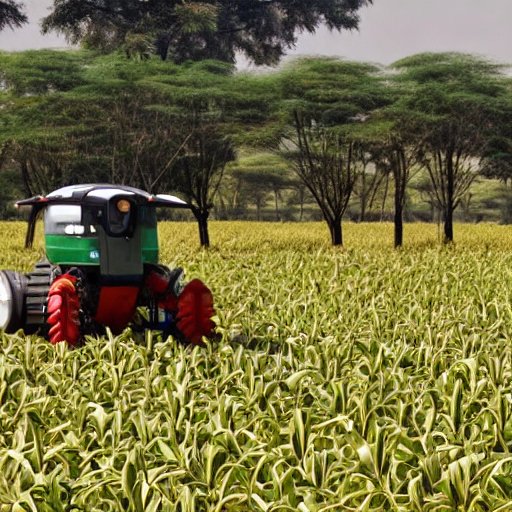Goodbye manual labor, hello robots - The future of agriculture in Africa
Date: Jan 08, 2023
Agricultural robotics has the potential to transform farming in Africa, where the agriculture sector is a vital part of the economy and employs over 60% of the population. Despite its importance, traditional farming methods often face challenges such as low productivity, limited access to modern equipment and technology, and vulnerability to climate change. Agricultural robotics has the potential to address these challenges and make farming a more sustainable, efficient, and profitable industry. In this blog post, we will explore the potential of agricultural robotics to shape the future of farming in Africa, including the benefits it can bring, the successes that have been achieved so far, and the challenges and opportunities that lie ahead.
Africa is home to a diverse range of farming systems and practices, and the challenges faced by farmers on the continent vary widely depending on the local context. However, there are some common challenges that many farmers in Africa face, including low productivity, limited access to modern equipment and technologies, and vulnerability to climate change. These challenges can make it difficult for farmers to generate sufficient income and improve their livelihoods.
There is also a trend of younger people in Africa moving away from manually tasking jobs such as farming in search of cleaner and more technologically advanced jobs. This can lead to a scarcity of manual labor for farming, which can be expensive and discourage existing and new farmers from entering the industry. Agricultural robotics has the potential to help address these challenges and make farming a more sustainable and profitable industry in Africa.
Agricultural robotics has the potential to bring a range of benefits to farmers in Africa, including increased productivity and efficiency, reduced need for labor, enhanced adaptability to changing weather conditions, and improved food safety and quality. Agricultural robots can work around the clock, lower labor costs, and be programmed to adapt to changing weather conditions. They can also reduce the need for chemical pesticides and fertilizers, promoting sustainable farming practices. The adoption of agricultural robotics in Africa has the potential to increase productivity, efficiency, and profitability on the farm, while also making farming a more attractive and sustainable option for younger people in Africa.
There are already some successful examples of agricultural robotics projects in Africa that have brought significant benefits to farmers and the local community. The “Taraba Rice Project” in Nigeria used a combination of precision agriculture technologies to increase rice yields by up to 300%. The “Robotics for Agriculture” project in South Africa is providing farmers with low-cost, easy-to-use farm robots that can perform tasks such as weeding, planting, and harvesting. The “Smart Farm” project in Ethiopia, supported by the International Maize and Wheat Improvement Center, is using precision agriculture technologies to help farmers improve their crop yields and reduce their use of inputs such as pesticides and fertilizers. These projects demonstrate the potential of agricultural robotics to bring significant benefits to farmers and the local community, and highlight the opportunities for further development and adoption of these technologies on the continent.
Agricultural robotics is still in its early stages in Africa, and there is significant potential for further development and adoption of these technologies on the continent. There is likely to be continued innovation and development of new technologies in the coming years, including new types of farm robots and advances in precision agriculture technologies such as GPS, sensors, and drones. As more farmers in Africa become aware of the benefits of agricultural robotics and the successes that have been achieved so far, it is likely that there will be increased adoption of these technologies on the farm. This could be driven by a desire to improve productivity and efficiency, reduce labor costs, and adapt to changing weather conditions.
The development and adoption of agricultural robotics in Africa is likely to be supported by partnerships and collaborations between farmers, researchers, startups, and government organizations. These partnerships could help to share knowledge and expertise, and to build the capacity of farmers and communities to adopt and benefit from these technologies. Agricultural robotics is a capital-intensive field, and the development and adoption of these technologies in Africa will require significant investment and funding, which could come from government programs, private sector investment, and international aid organizations. The future of agricultural robotics in Africa is likely to be shaped by a combination of these trends and opportunities, which have the potential to make a significant impact on the agriculture sector in Africa and help address some of the challenges faced by traditional farming methods.
In this blog post, we have explored the potential of agricultural robotics to shape the future of farming in Africa. We have outlined the benefits that agricultural robotics can bring, including increased productivity and efficiency, reduced need for labor, enhanced adaptability to changing weather conditions, and improved food safety and quality. We have also highlighted some successful examples of agricultural robotics projects in Africa and the opportunities that exist for further development and adoption of these technologies on the continent.
We believe that agricultural robotics has the potential to play a vital role in addressing the challenges faced by traditional farming methods in Africa and making agriculture a more sustainable and profitable sector. Agricultural robotics could help to increase productivity, efficiency, and profitability on the farm, while also making farming a more attractive and viable option for younger people in Africa who may be seeking cleaner and more technologically advanced jobs.
We encourage readers to consider the potential benefits of agricultural robotics and to support initiatives that aim to promote its adoption in Africa. We believe that agricultural robotics has the potential to be a transformative force in the agriculture sector in Africa, and we hope that this blog post has provided some insights into the exciting opportunities that lie ahead.
